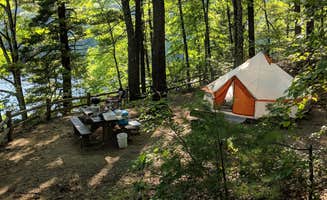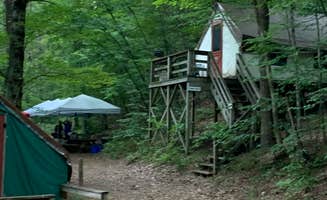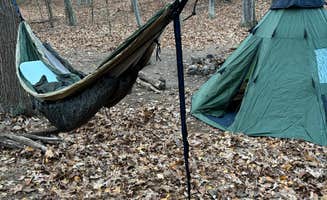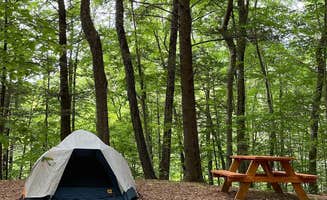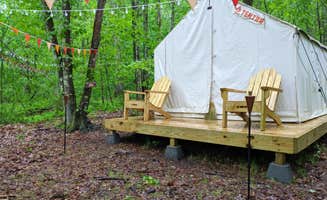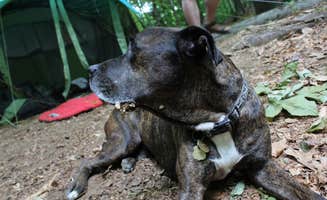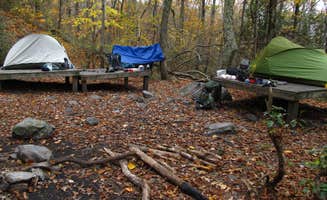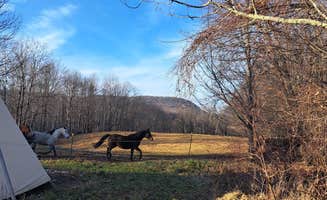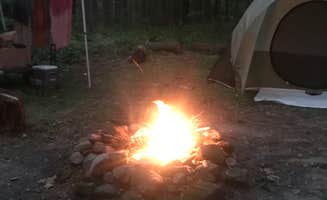Tent campsites near South Hadley, Massachusetts are situated in the western part of the state where the Connecticut River Valley meets the foothills of the Berkshire Mountains. The region's mixed hardwood forests create natural canopies over many campsites, with elevations ranging from 200-800 feet above sea level. Summer temperatures typically reach 80-85°F during the day and drop to 55-65°F at night, making tent camping comfortable with proper gear.
What to do
Paddle on Tully Lake: At Tully Lake Recreation Area, campers can rent canoes and kayaks to explore the numerous islands and shoreline. "We take our canoe and spend the whole day at the lake. You can find lots of private areas to swim, pick blueberries and relax," shares reviewer Ben P.
Hike to waterfalls: The 4-mile loop trail around Tully Lake features Doane's Falls, accessible via "a very quick walk from the campground area," according to Jean C. The trail is rated moderate and connects to longer routes for more experienced hikers.
Mountain biking: Trail networks throughout the region cater to various skill levels. "You can hike and bike (mtb). Nearby there are waterfalls (gorgeous) and a local mountain," notes Miguel B. about the options near Tully Lake.
River activities: Zoar Outdoor offers white water rafting and tubing on the Deerfield River. "It's close to where locals jump off outcrops into the lazy river and hang out on the river side," explains Seth K.
What campers like
Privacy between sites: At Chester Railway Station, the setup allows for privacy while still being accessible. "The caboose is stationed on a big grassy field, near a real railroad. It sleeps 4 and you can set up tents outside too," reports Esther L.
Car-free camping experience: Many campers appreciate the vehicle-free campsite areas. "No cars at all at the campsites, which was great for peace of mind as our toddler roamed around. It also made for a super quiet stay," explains Megan G. about her experience at Tully Lake.
Unique camping locations: Some sites offer distinctive settings unlike typical campgrounds. "We stayed on the island site, which was absolutely amazing. The views are to die for," shares Kris M. about her stay at Tully Lake.
Access to water: Many tent sites provide direct lake or river access. "We rented kayaks right at the campground for a paddle around Tully Lake," notes Megan G., highlighting the convenience of on-site rentals.
What you should know
Advance planning required: Popular campgrounds fill quickly, especially for holidays. "The sites fill up weeks out (and can completely fill the day registration opens, which is date-dependent each year)... so you have to be on your game," advises Kris M.
Gear transport logistics: Many tent sites require some effort to reach. At Barton Cove Campground, "You check in at the office, grab a key to unlock the gate, drive to the campground, unlock gate, drive through gate, lock gate, unload your stuff, drive to gate, unlock gate, drive through gate, lock gate, return key, drive back to campground, walk to your site," explains Brie B.
Limited cell service: Many camping areas have poor connectivity. "Cell phone coverage is faint to nonexistent on Verizon. You may want to download offline maps before you head out," notes Jean C. about Federated Womens Club State Forest.
Firewood regulations: Policies vary by campground. Some provide carts and wood for purchase, while others prohibit fires entirely. "They don't allow fires at the campsites though which is annoying," mentions Seth K. about Zoar Outdoor.
Tips for camping with families
Choose sites near bathrooms: For families with small children, bathroom proximity matters. "Our site was fairly far from services, long run with small kids in the middle of the night. Not our favorite place, but to be fair mostly based on our site and neighboring campers," shares Lauren A. about Tully Lake.
Prepare for gear hauling: With children, minimizing carrying distance helps. "Keeping gear to a minimum is a good idea," advises Miguel B., noting the challenges of hauling carts on trails at Tully Lake, where "the trails can make hauling them tough."
Plan for noise levels: Some campgrounds are quieter than others. "It's really meant for people who want to be outdoors in the woods...but not good for people who want to take their kids somewhere easy, so it tends to be more quiet," explains Kris M. about the atmosphere at Tully Lake.
Find beginner-friendly options: Onion Mountain Park offers accessible sites for new campers. "My BSA troop has been going here for years to help new scouts learn to camp. It is a very casual site and good for your first trip, you are close to your car and the road in case you need it," shares Marshall S.
Tips from RVers
Look for improved facilities: Some campgrounds have upgraded amenities. At Sodom Mountain Campground, "All roads are dirt and all potholes have been repaired. The clubhouse is being renovated and activities are now back. Great Wi-Fi now, store has been redone and grands are much nicer," reports Brad N., noting recent improvements.
Check road conditions: Many campground access roads are unpaved and may require higher clearance vehicles. "If so, high clearance vehicle is definitely preferred," notes Jean C. about accessing Federated Womens Club State Forest.


